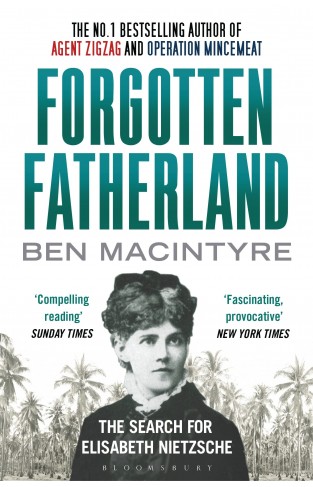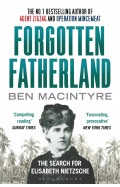Forgotten Fatherland: The Search for Elisabeth Nietzsche
By: Ben Macintyre
-
Rs 556.50
- Rs 795.00
- 30%
You save Rs 238.50.
Due to constant currency fluctuation, prices are subject to change with or without notice.
'Excellent travel writing: vivid, sympathetic, humorous' Guardian
'Fascinating, provocative and highly eccentric' New York Times
_______________________
In 1886 Elisabeth Nietzsche, the philosopher Friedrich's bigoted, imperious sister, founded a 'racially pure' colony in Paraguay together with a band of blond-haired fellow Germans. Over a century later, Ben Macintyre sought out the survivors of Nueva Germania to discover the remains of this bizarre colony.
Forgotten Fatherland vividly recounts his arduous adventure locating the survivors, while also tracing the colorful history of Elisabeth's return to Europe, where she inspired the mythical cult of her brother's philosophy and later became a mentor to Hitler. Brilliantly researched and mordantly funny, this is an illuminating portrait of a forgotten people and of a woman whose deep influence on the twentieth century can only now be fully understood.
'Excellent travel writing: vivid, sympathetic, humorous' Guardian
'Fascinating, provocative and highly eccentric' New York Times
_______________________
In 1886 Elisabeth Nietzsche, the philosopher Friedrich's bigoted, imperious sister, founded a 'racially pure' colony in Paraguay together with a band of blond-haired fellow Germans. Over a century later, Ben Macintyre sought out the survivors of Nueva Germania to discover the remains of this bizarre colony.
Forgotten Fatherland vividly recounts his arduous adventure locating the survivors, while also tracing the colorful history of Elisabeth's return to Europe, where she inspired the mythical cult of her brother's philosophy and later became a mentor to Hitler. Brilliantly researched and mordantly funny, this is an illuminating portrait of a forgotten people and of a woman whose deep influence on the twentieth century can only now be fully understood.
Josiah the Great: The True Story of The Man Who Would Be King
By: Ben Macintyre
Rs 597.00 Rs 995.00 Ex Tax :Rs 597.00
The Spy and the Traitor: The Greatest Espionage Story of the Cold War
By: Ben Macintyre
Rs 2,595.00 Ex Tax :Rs 2,595.00
Agent Sonya: The True Story of WW2s Most Extraordinary Spy
By: Ben Macintyre
Rs 1,836.00 Rs 2,295.00 Ex Tax :Rs 1,836.00
Forgotten Fatherland: The Search for Elisabeth Nietzsche
By: Ben Macintyre
Rs 556.50 Rs 795.00 Ex Tax :Rs 556.50
Operation Mincemeat: The True Spy Story that Changed the Course of World War II
By: Ben Macintyre
Rs 2,335.50 Rs 2,595.00 Ex Tax :Rs 2,335.50
Zubin Mehta: A Musical Journey (An Authorized Biography)
By: VOID - Bakhtiar K. Dadabhoy
Rs 630.00 Rs 1,050.00 Ex Tax :Rs 630.00
Josiah the Great: The True Story of The Man Who Would Be King
By: Ben Macintyre
Rs 597.00 Rs 995.00 Ex Tax :Rs 597.00
The Origins of Political Order From Prehuman Times to the French RevolutioN
By: Francis Fukuyama
Rs 3,895.00 Ex Tax :Rs 3,895.00
Manning Up: How the Rise of Women Has Turned Men into Boys
By: Kay Hymowitz
Rs 796.00 Rs 995.00 Ex Tax :Rs 796.00
The Obama Syndrome: Surrender At Home War Abroad
By: Tariq Ali
Rs 777.00 Rs 1,295.00 Ex Tax :Rs 777.00
The Quest For Meaning: Developing A Philosophy Of Pluralism
By: Tariq Ramadan
Rs 837.00 Rs 1,395.00 Ex Tax :Rs 837.00
The Pakistan US Conundrum Jihadists The Military And The People The Struggle For Control
By: Yunas Samad
Rs 837.00 Rs 1,395.00 Ex Tax :Rs 837.00
An Enemy We Created: The Myth Of The Taliban Al Qaeda Merger In Afghanistan 19702010
By: Alex Strick van Linschoten
Rs 4,200.00 Rs 5,250.00 Ex Tax :Rs 4,200.00
WikiLeaks: Inside Julian Assanges War on Secrecy
By: David Leigh & Luke Harding
Rs 680.00 Rs 850.00 Ex Tax :Rs 680.00
Josiah the Great: The True Story of The Man Who Would Be King
By: Ben Macintyre
Rs 597.00 Rs 995.00 Ex Tax :Rs 597.00
No recently viewed books available at the moment.
Zubin Mehta: A Musical Journey (An Authorized Biography)
By: VOID - Bakhtiar K. Dadabhoy
Rs 630.00 Rs 1,050.00 Ex Tax :Rs 630.00
Josiah the Great: The True Story of The Man Who Would Be King
By: Ben Macintyre
Rs 597.00 Rs 995.00 Ex Tax :Rs 597.00
The Spy and the Traitor: The Greatest Espionage Story of the Cold War
By: Ben Macintyre
Rs 2,595.00 Ex Tax :Rs 2,595.00
Agent Sonya: The True Story of WW2s Most Extraordinary Spy
By: Ben Macintyre
Rs 1,836.00 Rs 2,295.00 Ex Tax :Rs 1,836.00
Forgotten Fatherland: The Search for Elisabeth Nietzsche
By: Ben Macintyre
Rs 556.50 Rs 795.00 Ex Tax :Rs 556.50
Operation Mincemeat: The True Spy Story that Changed the Course of World War II
By: Ben Macintyre
Rs 2,335.50 Rs 2,595.00 Ex Tax :Rs 2,335.50
Josiah the Great: The True Story of The Man Who Would Be King
By: Ben Macintyre
Rs 597.00 Rs 995.00 Ex Tax :Rs 597.00



















-120x187.jpg?q6)





-120x187.jpg?q6)



-120x187.jpg?q6)



